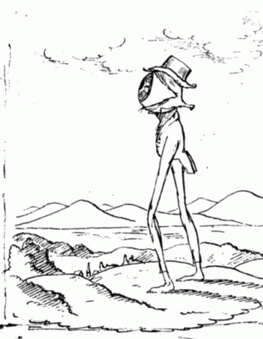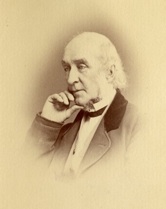Transcendentalism:
A mouthful of an idea!

When Ralph Waldo Emerson delivered his now famous Divinity School Address to Harvard’s graduating class in 1838, some of the ideas he put forth were so shocking that he was effectively banned from the campus for three decades. A beautifully ironic thought when you consider there’s now an Emerson Hall at Harvard today.
Clearly, Waldo’s new philosophy made an enormous impact on Boston’s thinkers - whether they agreed with it or not.
Beginning with the Emerson House, we’ll trace Waldo’s personal, sometimes tragic journey, which landed him in Europe for a time during the rise of Romanticism, in 1832. There he was further influenced and impressed by German philosophy, a Scottish writer and an English poet. Upon his return to the US about a year later, Emerson began some of his most intellectually productive years and, by 1836, had anonymously published, Nature, thus laying the foundation for Transcendentalism.
At Louisa May Alcott’s Orchard House, we’ll spend time with her remarkable father, Bronson, as he embraced and expanded on Emerson’s concepts, enthusiastically folding them into his teaching, writing, and even the raising of his daughters. Eventually, Bronson’s dream of a common location in which to share transcendental ideas was realized through the building of the School of Philosophy, first opened in 1880. Over the next eight years, the “Hillside Chapel”, as Bronson called it, would serve as a lecture hall and education center, with readings from Thoreau’s work and an address by Emerson amongst its most popular events.
After Orchard House, we’ll turn our focus to Henry David Thoreau, who quickly became a disciple of Emerson and, on the older man’s recommendation, began to keep a daily journal. Thoreau would maintain this practice for the next 24 years, and it would yield, among other things, his most famous book, Walden, as well as the essays "Walking", "Life Without Principal" and "Civil Disobedience." Our sojourn out at Walden Pond will give you the chance to experience the landscape and natural environment that inspired Thoreau's philosophies and writings for much of his adult life.
Our last stop, at Thoreau Farm Trust, will bring us to Henry’s birthplace and an interpretive space unlike any other in Concord. Here, the ideas of Thoreau will come to life as we’re able to discuss the meaning of his words and, view modern day examples of these thoughts and ideas put into practice.
An accessible, rather than esoteric, journey through some of Concord’s biggest brains!
Itinerary: (Available Wednesday-Saturday) * Emerson House, *School of Philosophy, Orchard House, Walden Pond and Thoreau Farm Trust
Includes: Transportation throughout your entire tour, two dedicated and knowledgeable tour guides, admission to all museums and historic sites, parking fees, a $10 meal voucher for one of several local restaurants, a Gatepost Tours tote bag and free shipping (US only) of any purchases made during your tour.
Duration: about 3.5 hours; choose from a 9:30 am or 2:00 pm departure time.
Cost: $139 per person.
Reservations: a minimum of two weeks advance notice
*Season dependent, will provide alternative destinations in winter.
©Copyright 2011 Gatepost Tours, LLC
While many of the images on this site don’t necessarily need captions, we felt this illustration, by Christopher Cranch, required some explanation, or it will assuredly bake your noodle.
From The American Transcendentalism website: “Christopher Pearse Cranch was a tireless contributor to the Transcendental periodicals... He enjoyed drawing caricatures, especially of Emerson and most notably one which gently teases Emerson for the transparent eyeball passage in Nature.”
The notorious passage goes like this: “I become a transparent eye-ball. I am nothing. I see all. The currents of the Universal Being circulate through me; I am part or particle of God.”
Let it not be said that Transcendentalism is boring!

Welcome to Gatepost > Tours and Services > Transcendentalism



A little irreverent. A lot of fun.


And if the transparent eyeball wasn’t mind boggling enough, try getting your
head around this one:
The gentleman in the above portrait is William Ellery Channing, Transcendentalist poet, of Boston. Not to be confused with his uncle, William Ellery Channing the Unitarian minister. Or his cousin, William H. Channing, likewise a Unitarian minister. Or his other cousin, William F. Channing, (son of William E. Channing), who is credited with the idea of the first telegraphic fire alarm system. Ellery Channing was also brother-in-law to Margaret Fuller, first editor of Transcendentalist journal, The Dial, through his marriage to her younger sister Ellen. After Ellen’s death, Channing spent his last years living with Frank Sanborn, a member of the “Secret Six” who worked to raise money for extreme abolitionist, John Brown, before the famous attack on Harpers Ferry, (although Channing had no knowledge of Sanborn’s associations.) Ellery is buried in Sleepy Hollow Cemetery across from his good friend, and walking companion, Henry David Thoreau.
If you think those are interesting and complicated connections, just wait
until you ask us about the Peabody sisters!



(William) Ellery Channing

